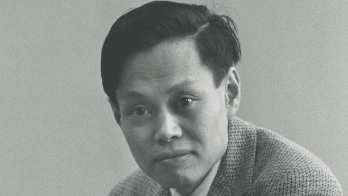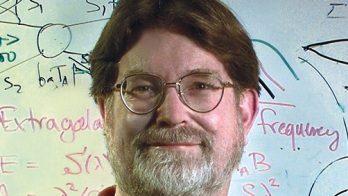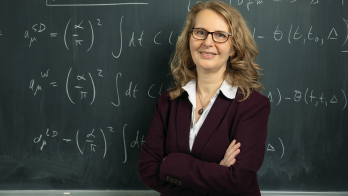In April 2002, the outstanding theoretical physicist Victor Weisskopf left us. In a single person he united the cultural traditions of Vienna, the liberal spirit of the Weimar republic, the lack of prejudice of the Danes and the healthy pragmatism of the Americans. These qualities faithfully reflect his long and singularly successful career.
I shall attempt neither to summarize here that career, nor to present a commented list of his most important contributions. This can be done (and has been done) by others – some more qualified than I. I want to write about Viki, my mentor and my friend for more than half a century, from the bottom of my heart.
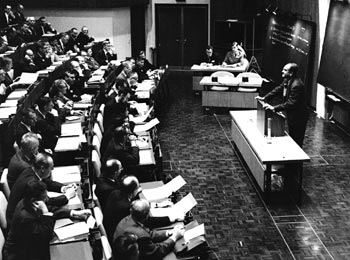
I first met Viki in1950 at ETH in Zurich, where I was a graduate student and he a visiting professor. He taught a wonderful course in nuclear physics, roughly based on notes for his forthcoming book with J Blatt. This book enabled many of us for the first time to understand the experiments that we were doing. Viki’s style was quite particular and some of his mannerisms were simply due to the fact that he was an American professor, one used to direct contact with the students – in contrast with the habits of the local faculty. Not only was he used to that contact, but he actively sought it. One salient feature of his character, one which later (when he ran CERN) played a great role, was his Leutseeligkeit, a Viennese term that can vaguely be translated as affability. In his lectures, Viki tried to use only quite elementary mathematics, but even so he frequently made mistakes. I must admit that we learned more from his mistakes (or, rather, from their corrections) than from many flawless, but uninspiring courses.
Meeting Viki in Zurich turned out to be decisive for my whole career: he promised to find me a job at MIT on his return there. Unfortunately (or fortunately) he discovered that there were no junior openings for the next academic year. “Under these circumstances”, he wrote, “I did the best for you that I could – I recommended you to Fermi.” Gratitude is too weak a word to express what I feel about this gesture even 50 years later.
Viki’s style in physics, especially after the war, was dominated by a quest for simplicity. In any theoretical situation, he always aimed to distill out the essence in its simplest mathematical form. He was particularly successful in this when the result had already been derived by cumbersome techniques, and I often accused him of being particularly skilled at making “postdictions”. That was perhaps too harsh, because his simplified re-derivations often enabled one to grasp the original derivations more clearly.
Viki, especially in his later years, loved to produce order-of-magnitude estimates of the most diverse physical effects, and he had planned a whole book on the subject. A typical problem was “How far can a bee fly on a drop of honey?”, and he wanted to get the answer in terms of fundamental atomic constants. Jokingly, I said to him: “Viki, you owe your whole career to the decimal system.” “Why?” he asked, and I replied: “You say that you can calculate only orders of magnitude. If we used a binary system, you would have to be right to within a factor two!” He accepted that with hearty laughter.
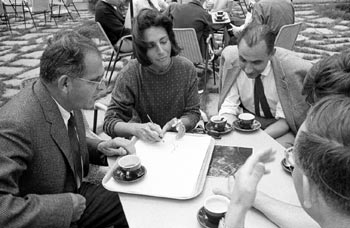
Viki was a true cosmopolitan in the literal sense of this word. The horrors of the Nazi regime have understandably polarized the attitudes of the Jewish survivors – some became rabid nationalists, while others, rejecting all forms of discrimination equally, became unshakable internationalists. Viki was decidedly in the latter camp, and maintained sincerely cordial relations with most of his German colleagues; he often visited his native country, Austria, without any bitterness. Similarly, although deeply aware of the shortcomings (to put it mildly) of the Soviet regime, he worked tirelessly to improve the contacts between Russian and Western scientists and even to promote collaborations between them.
Science, by its very nature, is an international or, more precisely, transnational activity. Music is even more so, because it has a universal language and can be enjoyed without any special training. Viki was deeply musical – both as a performer and as a listener. It was an unforgettable experience to hear him direct, during the celebration of his 65th birthday, a small orchestra playing a Mozart concerto.
During his tenure as CERN’s director-general, Viki made many wise choices that decisively shaped the future of the laboratory. These were, however, not his main contributions – the latter being of a more general nature: he set the style of the institution, the happy, smooth cooperation among people with the most diverse national traits. His appointments and promotions were based on qualification for the job, untainted by diplomatic juggling. CERN became a model for other joint European scientific undertakings. Last but not least, Viki enriched the scientific atmosphere of the laboratory through numerous excellent lectures.
One trait of Viki’s character was his self-confidence, his firmness devoid of arrogance. This characteristic enabled him to delegate tasks most skillfully – it made his reign a hard act to follow.
Those who had the privilege to know Viki personally will never forget him, as a man or as a physicist. To those who have not, I can only suggest that they read his autobiography, aptly titled The Joy of Insight – Passions of a Physicist.





